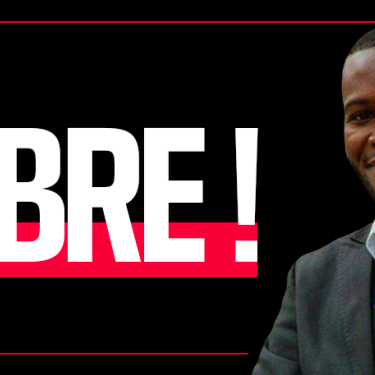Congolese journalist Stanis Bujakera soon to be free after six months in prison

Journalist Stanis Bujakera will soon be free. He has been sentenced to six months in prison, a sentence that covers the duration of his pre-trial detention. Reporters Without Borders (RSF) welcomes the fact that Stanis Bujakera, who has been held since 8 September 2023, will soon be free, but points out that he should never have been arrested, prosecuted, imprisoned and convicted on the basis of a case that was clearly fabricated against him.
It took 192 days, seven requests for his provisional release and international mobilisation for Stanis Bujakera to be notified of his imminent release.
The reporter for the Paris-based pan-African news magazine Jeune Afrique was sentenced to six months in prison on 18 March 2024 after more than six months behind bars, and fined one million Congolese francs. He was accused, among other things, of “forging and disseminating” a bogus intelligence agency memo.
During an investigation carried out in the Democratic Republic of Congo, RSF had nonetheless demonstrated the complete absence of evidence for the charges against Bujakera. He not only did not forge the memo but was not even the first person to get his hands on a copy. And several security sources confirmed to RSF that the disputed document really is a Congolese intelligence agency memo, just as Jeune Afrique originally reported.
"This decision comes after a cabal that cost this journalist, who had absolutely nothing to hide, more than six months of his freedom. Stanis Bujakera should never have been detained. As our investigation has shown, the proceedings against him were based on spurious accusations. We are extremely relieved for Stanis, his family, friends and colleagues, and we would like to thank all his supporters for their mobilisation. Stanis should never have been arrested, prosecuted, and convicted on the basis of a case that was clearly fabricated against him.
Over the past five months, the trial has exposed the prosecution's lies and crude attempts to fabricate evidence to justify its case against the journalist. It relied on a bogus expert report according to which the metadata of the incriminating document had made it possible to identify the journalist as its first distributor. A conclusion technically impossible to draw, as the representatives of the social networks on which it was broadcast themselves admitted, and confirmed by a new expert report carried out at a later date.
The public prosecutor, who also accused the journalist of having falsified an intelligence service seal on the document, also appeared to be in great difficulty when the seal that he claimed to be "authentic" and that he had produced during the trial turned out to be different from the one provided by the Congolese national intelligence agency...
Faced with this unfair procedure, Congolese President Félix Tshisekedi even admitted at a press conference on 22 February that the journalist was a "victim" of the "procrastination" of a "sick justice system".
The detention of Stanis Bujakera, deputy director of the Congolese news website Actualités.cd and correspondent for the pan-African magazine Jeune Afrique and the British news agency Reuters, has been the subject of a major campaign by RSF. The organisation conducted a series of investigations in the DRC that showed that the prosecution had no evidence to support its case against Bujakera. RSF also coordinated a campaign for his release that mobilised local and international supporters, and carried out a visit to the DRC to discuss the case with the authorities and appealed to the United Nations and the Media Freedom Coalition.
RSF is of the view that President Tshisekedi, who has just begun a second term, has much to do to shore up press freedom in the DRC. Last October, two months before the presidential election, RSF urged all the candidates to give ten undertakings to support press freedom and promote journalists’ safety.
RSF reiterates its call for the withdrawal of all charges against journalists who are arbitrarily detained in the DRC. RSF also calls on Tshisekedi to take measures to ensure the sustainability of the national mechanism for the safety of journalists, to overhaul the legal framework regulating journalism, and to combat impunity for those who kill journalists.
The DRC is ranked 124th out of 180 countries in RSF's 2023 World Press Freedom Index.
